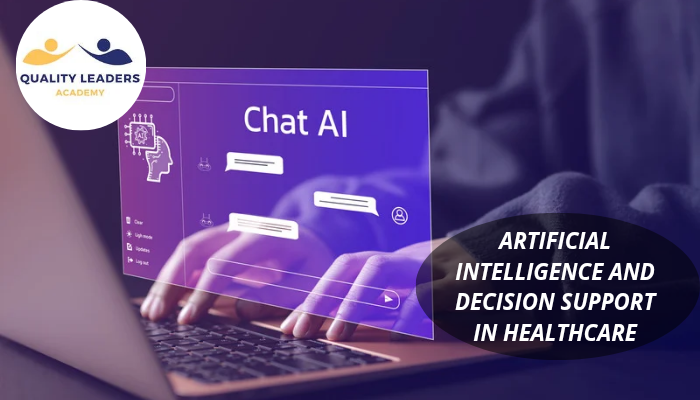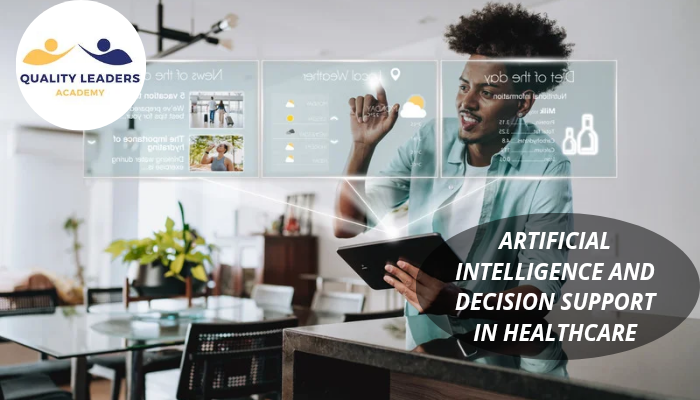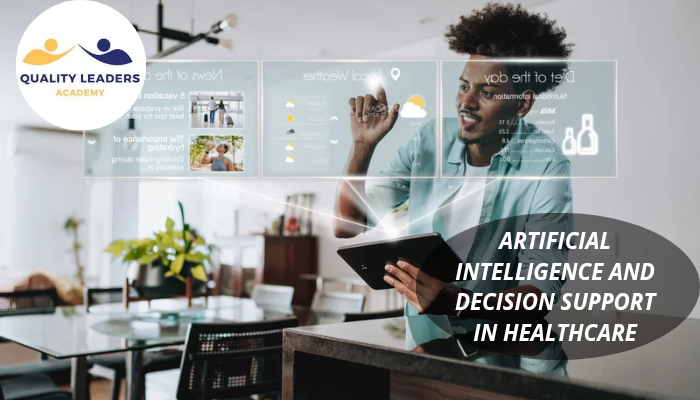Imagine a world where your doctor doesn’t just rely on experience and lab results, but on intelligent systems that analyze millions of similar cases in seconds. A world where healthcare professionals can detect diseases earlier, reduce medical errors, and make decisions supported by data-driven insights rather than instinct alone.
That world is no longer a dream. It’s the reality being shaped today by Artificial Intelligence and Decision Support in healthcare, two of the most transformative innovations in modern healthcare.
WHAT IS ARTIFICIAL INTELLIGENCE IN HEALTHCARE?

While we discuss Artificial Intelligence and decision support in healthcare, we must know that artificial intelligence in healthcare refers to the use of advanced algorithms and machine learning models that mimic human intelligence to analyze complex medical data. From detecting cancer in radiology images to predicting patient deterioration in intensive care units, AI acts as a powerful partner to healthcare professionals, not a replacement for them.
According to research published in JMIR (2025), AI tools are increasingly being embedded into clinical workflows, helping providers interpret massive datasets that would be impossible for humans to process alone. These systems can identify subtle patterns in lab results, medical imaging, and even genetic information, giving clinicians an extra layer of insight.
THE ROLE OF ARTIFICIAL INTELLIGENCE AND DECISION SUPPORT IN HEALTHCARE
A Decision Support System (DSS) is like a digital assistant for healthcare professionals. It doesn’t make decisions for them, but it provides evidence-based recommendations, alerts, and insights that help them make better choices.
Clinical Decision Support Systems (CDSS), powered by AI, combine data from electronic health records (EHRs), patient monitoring devices, and research databases. This integration enables doctors and nurses to:
- Detect potential drug interactions before prescriptions are finalized.
- Receive early alerts about patient deterioration.
- Access treatment guidelines tailored to each patient’s profile.
- Predict patient outcomes and optimize care pathways.
In essence, CDSS tools serve as intelligent advisors, ensuring that both experience and data guide every clinical decision.
AI AND DECISION SUPPORT IN ACTION
Let’s take a real example: in hospitals across Europe and the Middle East, AI-powered systems are enabling radiologists to analyze X-rays, CT scans, and MRIs more efficiently and accurately.
Highlight that AI-assisted image analysis can improve diagnostic accuracy by up to 20%, significantly reducing the risk of human error.
In intensive care units, predictive analytics driven by AI can monitor vital signs in real time and warn clinicians before a patient’s condition worsens. This proactive approach can save lives, especially in critical situations like sepsis, where every minute matters.
Meanwhile, in primary care, AI-driven decision support tools help general practitioners by suggesting diagnostic possibilities, highlighting abnormal test results, and even identifying patients who may be at risk of chronic diseases based on lifestyle data.
ETHICAL AND HUMAN DIMENSIONS
As promising as AI sounds, it’s important to remember that healthcare is not just about data; it’s about people.
AI systems can process information faster than any human, but they lack empathy, emotional understanding, and ethical judgment. Therefore, AI should be viewed as a partner, not a replacement.
Healthcare professionals remain central to the decision-making process, ensuring that every recommendation from AI aligns with the patient’s unique values, context, and emotional needs.
The European Commission’s Digital Health and Care framework emphasizes this balance, promoting “trustworthy AI” that is transparent, ethical, and human-centered.
This means clinicians must understand how AI arrives at its conclusions, and patients should have confidence that their data is used responsibly and securely.
BENEFITS OF AI-DRIVEN DECISION SUPPORT
- Improved Accuracy: AI can process massive data sets and detect subtle trends that human eyes might miss.
- Faster Decision-Making: Automated alerts and recommendations help doctors act quickly, especially in emergencies.
- Personalized Treatment Plans: AI can tailor care recommendations based on genetics, history, and lifestyle.
- Cost Reduction: By preventing errors and optimizing resource use, AI reduces unnecessary tests and hospitalizations.
- Enhanced Patient Outcomes: When doctors have better tools, patients receive faster, safer, and more effective care.
Challenges and Limitations
Despite the benefits, there are challenges.
Data privacy remains a major concern, healthcare data is sensitive, and breaches can have serious consequences.
Moreover, AI models are only as good as the data they’re trained on; biased or incomplete data can lead to inaccurate predictions.
Another issue is user acceptance. Many clinicians worry that artificial intelligence and decision support in healthcare could replace their judgment or overwhelm them with alerts. For AI decision support to succeed, it must be designed with clinicians in mind, simple, transparent, and integrated into their workflow.
Ongoing training is also key. Programs such as CPHIMS (Certified Professional in Healthcare Information and Management Systems) help professionals understand how to safely and effectively use AI and decision-support technologies in clinical environments.
THE FUTURE: FROM REACTIVE TO PREDICTIVE MEDICINE

Traditional healthcare often reacts to illness. Artificial intelligence and decision support in healthcare is helping shift that model toward predictive and preventive care.
By analyzing years of population data, AI systems can identify individuals at high risk of conditions like diabetes or heart failure, even before symptoms appear.
This enables early intervention, lifestyle counseling, and monitoring that can prevent hospital admissions and improve long-term health outcomes.
In the future, Artificial Intelligence and decision support in healtcare may become part of every clinician’s toolkit, offering real-time, evidence-based insights directly during patient consultations.
Artificial Intelligence and Decision Support in healthcare are not replacing doctors; they’re enhancing them.
Together, they are transforming healthcare from a reactive and fragmented system to a proactive and personalized one.
For healthcare professionals pursuing certifications like CPHIMS, mastering AI and clinical decision support is no longer optional; it’s essential.
The next generation of healthcare leaders will be those who can blend human compassion with digital intelligence.
As we move forward, one truth remains clear:
The most powerful healthcare system is not one led by machines or humans alone, but one where humans and AI work hand in hand to make every decision smarter, safer, and more humane.
Read also:
Digital Transformation and Interperability in Healthcare
Cybersecurity, Privacy & Data Governance in Healthcare
Resources:
https://pmc.ncbi.nlm.nih.gov/articles/PMC10916499/
https://health.ec.europa.eu/ehealth-digital-health-and-care/artificial-intelligence-healthcare_en


